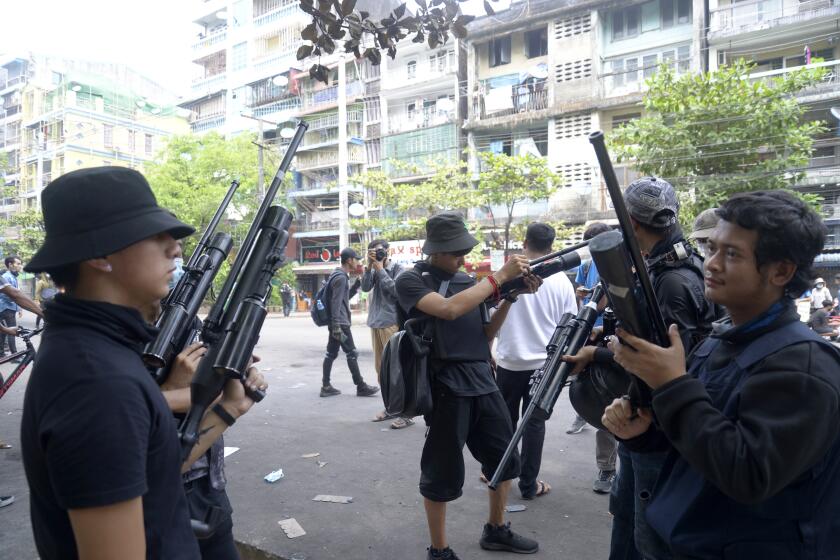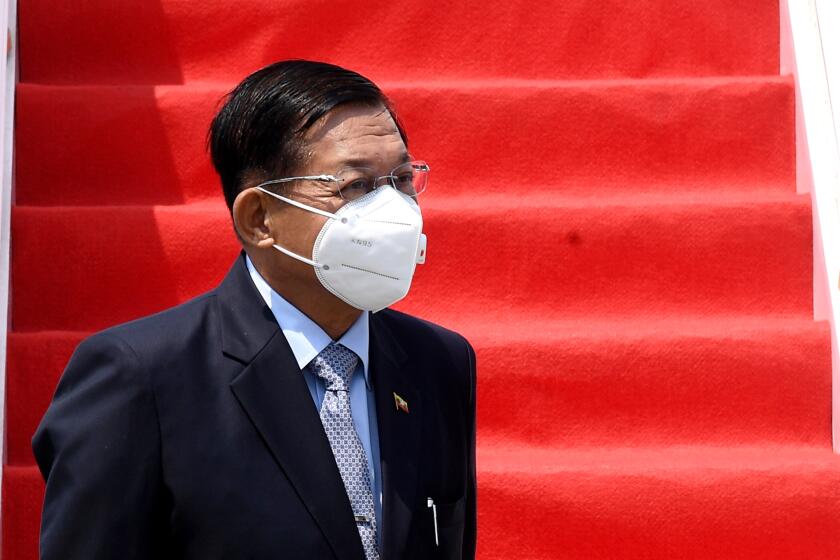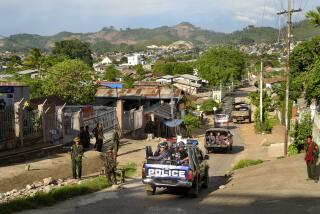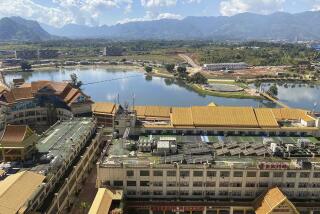Ethnic guerrillas allied with Myanmar resistance capture army base, prompting airstrikes
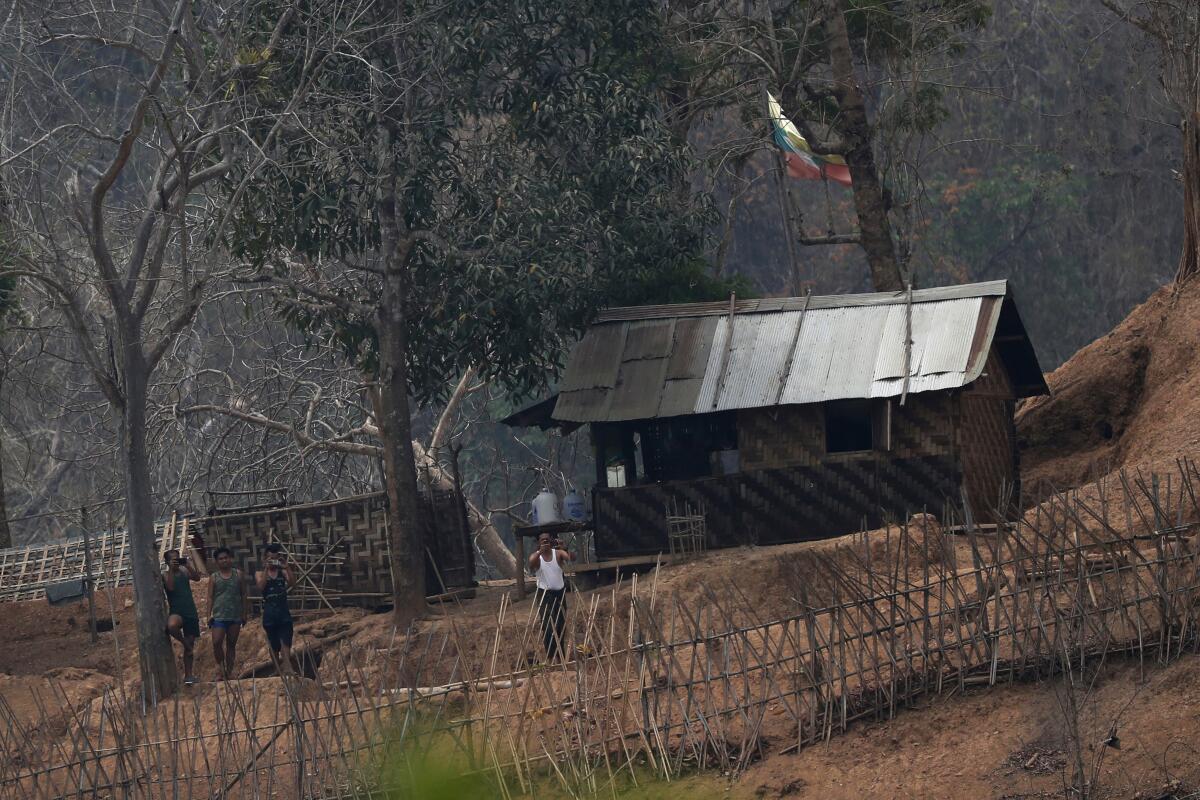
- Share via
BANGKOK, Thailand — Ethnic Karen guerrillas said they captured a Myanmar army base Tuesday near the border with Thailand, in a morale boost for those opposing the military’s takeover of the country’s civilian government in February.
Myanmar’s military staged airstrikes several hours later on villages in territory controlled by the Karen forces, according to a guerrilla spokesman, a senior Thai official and a relief worker.
The fighting took place three days after a meeting of Southeast Asian leaders to try to hammer out a plan to restore peace in Myanmar, where the military government has attempted to suppress widespread opposition to its rule through the use of lethal force. More than 700 protesters and bystanders have been killed by security forces, according to several detailed estimates. The junta’s figure is about one-third of that.
A spokesman for the Karen National Union, or KNU, the minority group’s main political organization seeking greater autonomy from Myanmar’s central government, said the group’s armed wing attacked the base at 5 a.m. and burned it down just after dawn.
Casualty figures were not yet known, the KNU’s head of foreign affairs, Padoh Saw Taw Nee, said in a text message. There was no immediate comment from Myanmar’s military government.
The KNU, which controls territory in eastern Myanmar near the border with Thailand, is a close ally of the movement against the military coup that ousted the elected government of Aung San Suu Kyi. The KNU’s armed wing is the Karen National Liberation Army.
Video shot from the Thai side of the border showed flames rising from the government position on the banks of the Salween River, amid the sound of heavy gunfire. The river marks the border with Thailand.
Anti-coup demonstrators are abandoning peaceful protest for armed resistance as the deposed civilian government appeals to ethnic rebels to join the fight. The United Nations warns of a ‘bloodbath.’
Padoh Man Man of the KNLA’s 5th Brigade, which launched the morning’s attack, said the military carried out airstrikes in the afternoon, but he did not know the number of casualties. He described the air raids as a “heinous war crime” and called for the international community to pressure the junta to stop them.
Sithichai Jindaluang, the governor of Thailand’s Mae Hong Son province, confirmed at a news conference that Karen guerrillas had overrun the Myanmar base and said a woman on Thai soil was wounded by a stray bullet during the fighting. He said about 450 villagers have been evacuated from Mae Sam Laep.
He also said a Myanmar military aircraft later bombed a Karen village.
Indonesia’s president says Southeast Asian leaders have demanded an immediate end to killings and the release of political detainees in Myanmar
Dave Eubank of the Free Burma Rangers, a humanitarian aid group with extensive experience in the area, said he could confirm that there had been airstrikes on Karen villages in two townships in Papun district. He said five bombs were dropped but caused no casualties. Myanmar’s army was also staging ground attacks in the area, Eubank said.
Fighting between the KNU’s armed wing and Myanmar’s military has been intense since February.
Myanmar jets have bombed and strafed Karen villages since March 27, and its army has deployed fresh battalions to the area, in possible preparation for a large-scale offensive. Up to 25,000 villagers have fled their homes and are hiding in jungles and caves, according to Eubank.
In response, the KNLA has kept up attacks on Myanmar patrols and bases.
Breaking News
Get breaking news, investigations, analysis and more signature journalism from the Los Angeles Times in your inbox.
You may occasionally receive promotional content from the Los Angeles Times.
There is a similar situation in northern Myanmar, where the Kachin minority has claimed to have captured several government outposts and been the target of air attacks.
The Karen and the Kachin are two of the bigger minority groups that have been seeking greater autonomy for decades, during which there have been periods of armed conflict punctuated by cease-fires.
The city-based resistance movement against the ruling junta has wooed the ethnic guerrilla groups in hopes that they can form a federal army to counter the government’s armed forces. A parallel National Unity Government established by elected lawmakers prevented from taking their seats by the army has appointed representatives of several minority groups to ministerial posts.
On Tuesday, a flash mob of anti-military protesters surged through an area of Yangon, Myanmar’s biggest city, for the second successive day to show fleeting but unyielding defiance of the ruling junta.
Such open protests have become less frequent since a brutal crackdown by the security forces began in Myanmar, also known as Burma. But activity has picked up after Saturday’s meeting of the Assn. of Southeast Asian Nations in the Indonesian capital, Jakarta, with junta chief Senior Gen. Min Aung Hlaing in attendance.
The ASEAN meeting prompted some guarded optimism after it issued a statement reporting a “five-point consensus” on Myanmar’s crisis. It called for the immediate cessation of violence, a dialogue among all concerned parties, mediation of the dialogue process by an ASEAN special envoy, provision of humanitarian aid through ASEAN channels, and a visit to Myanmar by the special envoy to meet all concerned parties.
However, a statement from the junta about the meeting published in Tuesday’s state-run Global New Light of Myanmar newspaper made no mention of the consensus statement. It emphasized that Myanmar would “give careful consideration to constructive suggestions made by ASEAN Leaders when the situation returns to stability in the country since priorities at the moment were to maintain law and order and to restore community peace and tranquility.”
More to Read
Sign up for Essential California
The most important California stories and recommendations in your inbox every morning.
You may occasionally receive promotional content from the Los Angeles Times.
